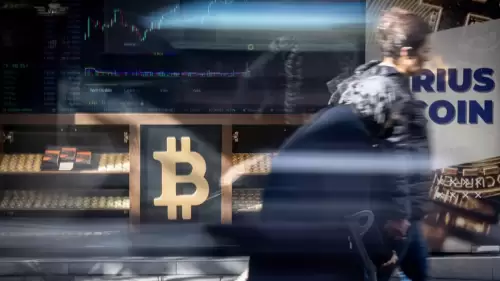 |
|
 |
|
 |
|
 |
|
 |
|
 |
|
 |
|
 |
|
 |
|
 |
|
 |
|
 |
|
 |
|
 |
|
 |
|
Cryptocurrency News Articles
Confused About the Phrase “Bitcoin Contract Address†?
May 09, 2025 at 05:21 pm
Beginners coming from the world of Ethereum or DeFi often expect every blockchain to work the same.

Beginners coming to Bitcoin from the world of Ethereum or DeFi often expect every blockchain to work the same. But that’s not reality. Bitcoin’s architecture is different. No contract addresses here.
That single twist has caused endless confusion, wasted hours, and lost funds for unwary users. I’ll explain why this happens, what’s actually going on, and how not to get tripped up by this common misunderstanding.
Key highlights:
Why Bitcoin doesn't have contract addresses
You might have seen the term smart contract used in articles or heard it from YouTube influencers. The term itself goes way back; the concept was dreamed of back in the 90s. But a contract address on Bitcoin isn’t a thing, and it is not in the way you might expect coming from something like Ethereum contract addresses.
Bitcoin uses a “UTXO model.” Ethereum? That’s account-based, with addresses tied to both people and smart contracts. In Ethereum, these special contract addresses live on the blockchain, ready to execute any code they hold. Bitcoin only technically supports limited scripts for validating transactions. There are no general-purpose smart contracts, so no contract addresses.
If you’re hunting for a "Bitcoin contract address," you’re barking up the wrong tree. That’s not how Bitcoin works.
Understanding Bitcoin’s UTXO model
Here’s where it gets to sounding technical, but it’s actually simpler than it sounds. Bitcoin operates on a “Unspent Transaction Output” (UTXO) system.
This runs counter to Ethereum’s system, where each address is like an account that stores balances and, sometimes, code. Not so with Bitcoin. Each address is “dumb”; there’s no logic, no bells or whistles, just a destination for coins.
What is a contract address on Ethereum?
Ethereum has two main address types: user addresses and contract addresses. A contract address on Ethereum points to a deployed smart contract (basically, software living on-chain) that does something when you interact with it.
You can:
People often search for a "Bitcoin contract address" hoping to find something similar, usually to bridge Bitcoin somewhere else or get in on a token launch. That’s the source of endless headaches.
Common reasons people search for «Bitcoin contract address»
The confusion isn’t random. New users hear about neat tricks, such as cross-chain bridging from Bitcoin to Ethereum, minting tokens on Bitcoin, and using new “Bitcoin DeFi” platforms. Here’s what usually drives the search:
Wrapped Bitcoin and its contract address
Wrapped Bitcoin (WBTC) is perhaps the #1 reason for mix-ups. You want to use Bitcoin on Ethereum? You need to convert it to an ERC-20 token—WBTC.
No real “Bitcoin contract address” exists for this operation—it only lives on Ethereum. The contract address in question is for an Ethereum token, not a native Bitcoin address.
BRC-20 Tokens and other protocols on Bitcoin
Bitcoin wasn’t designed for tokens. But clever code has allowed basic tokens like BRC-20. These are experimental standards that run on Bitcoin. They are adding new layers but still can’t provide full-blown contract addresses.
BRC-20 is neat, but it won’t give you the contract address experience you’re used to from Ethereum.
Expanding Bitcoin’s capabilities: Smart contracts and sidechains
People keep trying to bolt new features onto Bitcoin, like sidechains and layer-2 solutions, for example. Think of RSK, Stacks, and other projects that are making Bitcoin stronger:
These tools are exciting, but always be cautious. Most are experimental or operate under different security assumptions than Bitcoin itself.
The bottom line
Here’s the bottom line: The idea of a "Bitcoin contract address" is mostly a misunderstanding. Bitcoin does not use contract addresses like Ethereum. If you’re using Bitcoin, you’re dealing with simple addresses, without contract logic attached. All the fancy contract stuff is bolted on later, either on sidechains or by bridging over to other blockchains.
If you’re working with wrapped tokens, DeFi, or experimental protocols, always double-check which chain you’re on and what kind of address you actually need. Don’t send Bitcoin to an Ethereum contract address and expect magic to happen—it won’t, and there’s no customer support for on-chain mistakes.
Want more info before you jump into DeFi or token experiments? Keep learning with in-depth resources and don’t be afraid to ask questions—crypto is still a wild frontier, and smart research is your best protection. Stay sharp. And remember: on Bitcoin, an address is just an address. No contracts. No tricks. Just Bitcoin.
Disclaimer:info@kdj.com
The information provided is not trading advice. kdj.com does not assume any responsibility for any investments made based on the information provided in this article. Cryptocurrencies are highly volatile and it is highly recommended that you invest with caution after thorough research!
If you believe that the content used on this website infringes your copyright, please contact us immediately (info@kdj.com) and we will delete it promptly.

























































